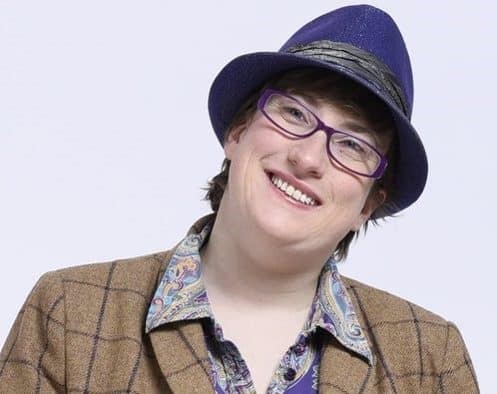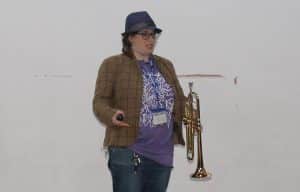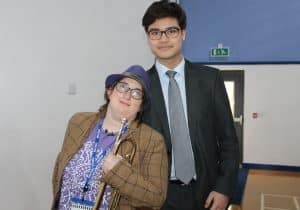“Life is messy”: autistic speaker draws some universally applicable lessons from her perspective

Award-winning speaker Robyn Steward told Year 10 and 11 boys of how she emerged from years of bullying to become a successful speaker, author, academic researcher and musician.
Delivering the Spring Middle School Lecture, Robyn, an Ambassador for the National Autistic Society, gave the boys insights into the particular problems faced by autistic people, but also suggested some ways in which everyone could benefit from what she has learned.
Pointing out that life does not always unfold in a straight line, she said it was important to make the most of the present: “Life is messy. All I’ve got is today – and when I realise that, it makes me a happier person,” she said.
 “Find your tribe” – those people one belongs with – she urged the boys, adding: “Don’t worry if you haven’t found your thing yet; keep looking.” She, for example, had had no idea when she started out on her career that she would end up as a professional musician, yet she now plays the trumpet and has put on “inclusive-conscious” gigs entitled Robyn’s Rocket in London.
“Find your tribe” – those people one belongs with – she urged the boys, adding: “Don’t worry if you haven’t found your thing yet; keep looking.” She, for example, had had no idea when she started out on her career that she would end up as a professional musician, yet she now plays the trumpet and has put on “inclusive-conscious” gigs entitled Robyn’s Rocket in London.
Head of Academic Enrichment Nisha Mayer said: “I would like to thank Robyn for giving a lecture that contrived to be both inspiring and humorous, while at the same helping to deepen the boys’ understanding of autism.”
In her talk entitled Autism from a person, not a textbook, Robyn told her audience in the Shearly Hall that she wished she had had the opportunity to hear an autistic speaker when she was at school, as she was just made to feel different and “weird”.
She had been widely bullied and called names such as “retard” or “spastic”. This was the result of ignorance and of her classmates being “jokey”. In her view, there were two types of bullying, she explained – the “jokers” trying to raise a laugh from their friends at the expense of someone else, and those who are “mean at heart’. The majority are the former, who, she believed, would be shocked to realise she was talking all these years later about the harmful effects of what they had said.
She was in a special needs class at primary school, but the bullying really started in high school, she said. Recalling the great insecurity she felt about visiting the toilets, she explained that she had been told the other pupils would “flush her head down the loo” and, as an autistic person, she had taken this very literally. Robyn has cerebral palsy, so she was also worried about not being able to operate the locks properly. She was, in fact, locked in the toilet, manhandled and called names. Fortunately, her mother supported her in this ordeal, she said.
 Speaking about the effects of bullying generally, she said: “I don’t think anyone should have to feel like that. It is crushing for your self-confidence.”
Speaking about the effects of bullying generally, she said: “I don’t think anyone should have to feel like that. It is crushing for your self-confidence.”
In 2015, Robyn was joint awardee of the National Autistic Society’s Professional award for outstanding achievement by an individual on the Autism Spectrum for her work in raising awareness of the abuse experienced by autistic people. In 2018, she was listed on the Power 100 list of the most influential disabled people in the UK.
We can all do something to combat bullying, she told the QE boys. If they saw a friend saying unkind things, they could say: “Hey, stop it! That person has feelings,” and could also tell the target of the bullying not to worry about it. And since the boys comprise a community at QE, they should work together and support each other, recognising that everyone experiences low self-esteem at times.
At college, she had more freedom to protect herself – she could leave a room when she chose, for example. She studied IT – and “really enjoyed it”, despite further bullying – and then art & design. She learned at college about the concept of Theory of Mind, which was a huge insight: she realised that being autistic, she had struggled to understand someone else’s perception of a situation in the way that others do through empathy or reading facial expression or observing body language. All of this she had to learn from scratch.
 Showing the boys her school photo, she asked them what was different about her (and stated that their age group is normally better at spotting the answer than adults!). Unlike her peers, she was not looking at the camera and was not smiling, she pointed out, adding that this is because many autistic people do not pick up on social cues.
Showing the boys her school photo, she asked them what was different about her (and stated that their age group is normally better at spotting the answer than adults!). Unlike her peers, she was not looking at the camera and was not smiling, she pointed out, adding that this is because many autistic people do not pick up on social cues.
In spite of all the bullying, she now has a full and varied life, Robyn said. “I have no GCSEs and yet here I am, aged 33, saying I’ve turned out all right.” She has a BBC podcast with fellow autistic presenter Jamie Knight – 1800 seconds on autism – and is also host of the Autism Matters podcast from Autism: The International Journal of Research and Practice. She works with UCL and the Wellcome Trust, conducting research to understand how we are all different. For more than 15 years, she has been travelling the world giving talks. She is the author of books providing guidance for autistic people.
Afterwards, Year 13 pupil Saifullah Shah complimented Robyn on her talk and then opened the floor up for questions.
